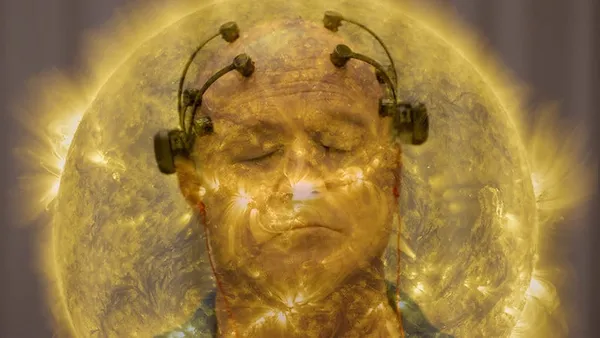Eye For Film >> Movies >> All Light, Everywhere (2021) Film Review
All Light, Everywhere
Reviewed by: Matthew Anderson

A documentary that is as introspective and self-reflexive as it is revelatory, Theo Anthony’s All Light, Everywhere inspects the very nature of looking and image-making by probing notions of objectivity and prejudice, neutrality and intent. Is it possible for a human being – or indeed artificial intelligence – to contemplate anything without judgement, preconception or ulterior motive? In an age of extraordinary technological advancement, is surveillance a tool for protection, manipulation or control?
And, in acknowledging that as much is cut off from outside a frame as appears within it, though a picture may paint a thousand words, does the real truth of an image lie outside its edges? High-minded, head-scratching questions of point of view and perspective abound from the outset. Adopting a remarkably broad field of vision, and a construction that is both provocative and informative, the American filmmaker opens the aperture of his investigative gaze high and wide. From an extreme retinal close-up in the film’s opening moments, later drawing back to the ‘God’s eye view’ of a reconnaissance plane many thousands of feet above the earth, All Light, Everywhere examines the microscopic and vertiginous in equal, beguiling measure.
Anthony adroitly hangs his philosophical musings upon a three-pronged physical framework, a rough through-line that provides some way to navigate the kaleidoscope of visual and cerebral stimuli. A tour of the Axon Enterprise facility in Scottsdale, Arizona, forms much of the film. Here, we see each stage in the company’s production of their signature body cameras and tasers; parallel to this is a training session, where Baltimore police are instructed on their practical use. Interestingly, the director appears onscreen at Axon, directing spokesperson Steve Tuttle on where to stand, giving him his mark, crafting the right shot.
Acutely aware of the mechanics of his trade, Anthony shows us what he wants us to see, including his own role as creator of images. Similarly, for all his measured, well-trained PR spiel on openness and transparency, the company’s research and development department sits in a 'black box' behind one-way glass that Tuttle does not reveal. Everyone has their secrets. But what are the implications of this if a private company and a city’s police department spy on their citizens without their knowledge or prior consent? Ross McNutt’s Persistent Surveillance Systems looked down on protests in the wake of a not-guilty verdict after Freddie Gray died at the hands of Baltimore police officers. Attempting to bring his “live version of Google Earth” out of the shadows years thereafter, he – unsurprisingly – meets resistance from community groups, distrustful of his supposedly honourable intentions to reduce street crime in the city.
Conversely, irritable glances from one or two officers in the body cam training sessions directed at Anthony's camera show that when the tables are turned, perhaps they feel some sense of this same invasion of privacy. There is a deftness to the director’s suggestions that raises flags without pointing fingers or casting aspersions, but that does show just how important multiple frames of reference can be in forming a full image. Elsewhere, volunteers are submitted to psychoanalytical tests as they watch and react to various media on a laptop screen. With our own headsets or thinking caps on, and drawn into this, how do we react to all that All Light, Everywhere shows us? The dizzying, cyclical, multi-layered nature of the film is reinforced by an intense, hypnotic, other-worldly score by Dan Deacon that builds to moments of swirling crescendo.
And a comparable scope and elasticity is felt in the historical depth of field provided by a recurring, disembodied female voiceover. Neutral, and ironically almost robotic in tone, it explores the early origins of capturing distant images, criminal profiling, the weaponisation of photography and its ability to spy on an enemy out of reach of the human eye. Have we learned from these antecedents or are the same mistakes, tarnished by human prejudice, motive or experience, being made again? “An act of seeing is always an act,” she states. Only in turning a camera around to look at those controlling a narrative can light be shed on truth and meaning. All Light, Everywhere acknowledges that its focused lens conceals as much as reveals, but it does so in plain sight, which is more than can be said for most.
Reviewed on: 03 May 2021

















